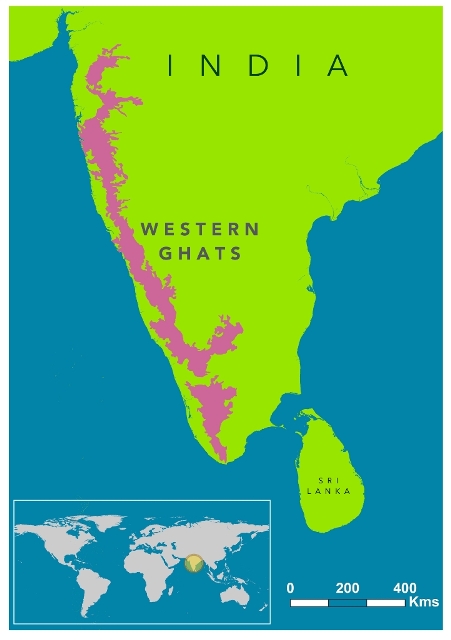India is home to two global biodiversity hotspots, namely the Western Ghats and the Eastern Himalayas. These two sites hold approximately 6% of the world’s biodiversity and make up only 0.2% of the Earth’s landmass. In the Western Ghats hotspot, the southern part has received more attention since the last four decades due to large number of protected areas suitable for conservation research. However due to most of the open access nature of landscape and lack of legal protection in the form of protected areas, northern part of Western Ghats has been data deficient. AERF has been promoting the importance of this part since last two decades and could contribute to innovative solutions for conservation on the ground in this landscape through various programmes and projects.




The Northern Western Ghats
 Part of the Western Ghats - a global biodiversity hotspot that is home to 2% of the world’s biodiversity as designated by the United Nations (UN)
Part of the Western Ghats - a global biodiversity hotspot that is home to 2% of the world’s biodiversity as designated by the United Nations (UN) A mountain range that supports an immense amount of biological diversity of approximately 5000 species of flowering plants and 600 species of birds
A mountain range that supports an immense amount of biological diversity of approximately 5000 species of flowering plants and 600 species of birds A biodiversity haven with several acres of privately owned forests within crucial wildlife corridor zones which are under serious threat of logging , ignorance and apathy
A biodiversity haven with several acres of privately owned forests within crucial wildlife corridor zones which are under serious threat of logging , ignorance and apathy
Our Sites
Sangameshwar taluka is located in the Ratnagiri district of Maharashtra, situated between the coast and the Western Ghats. Situated in the Northern parts of the Western Ghats the area is biodiversity rich and needs conservation efforts to protect this filthy crucial land. Since its establishment in 1994, AERF has been working in the region to build a strong link between conservation research and its practical applications through 5 our programmes revolving around the main theme “Conservation on the ground”.
Bhimashankar Wildlife Sanctuary (BWLS) is a famous pilgrim tourism destination from Maharashtra. It is also known for healthy population of Indian Giant Squirrel (Ratufa indica) and the indigenous community - Mahadeo Koli. It is an internationally acknowledged Important Bird Area (IBA). The Applied Environmental Research Foundation (AERF) has been working in the BWLS since 2006 to develop ecologically and socially sustainable solutions through eco-tourism and sustainable value chains for NTFPs.
Alibaug, situated on the western coast of Maharashtra is the headquarters of the Raigad district and home to forest-dependant tribal communities like Katkari and Thakur. In order to address the energy issues in such rural parts of Maharashtra, AERF has established a decentralized bio-diesel resource center in Mahajane village in Alibaug, supported under Global Village Energy Program (GVEP). Started 10 years ago, the project focuses on the utilization of existing indigenous bio-diesel yielding tree species- Karanja (Pongamia pinnata) for satisfying the village energy needs.
Sindhudurg is a narrow coastal plain situated in the Konkan region in western Maharashtra. It is situated between the Arabian Sea towards to west and Western Ghats towards the east. The district is well known for its naturally enriched flora and fauna. AERF has been working in the region to revive the tradition of Sacred Groves and 10377523protect private forests under Conservation Agreements. We are proud to say that in the year 2010-11, through the biodiversity assessment and with the support from villagers AERF could secure the land in Asaniye and Dabhil from devasting mining project.
Bhandara District is an administrative district in the state of Maharashtra and shares border with Chandrapur District to the South, Gondia District to the East, and Nagpur District to the west. Since 2013 AERF has been working in this part of Maharashtra to provide improved access to cleaner energy source and create sustainable livelihoods of tribal communities by establishing a decentralized biodiesel resource centre. With the focus on the utilization of existing indigenous bio-diesel yielding tree species- Mahua (Madhuca indica) a decentralized biodiesel resource centers project supported under Global Village Energy Program (GVEP).